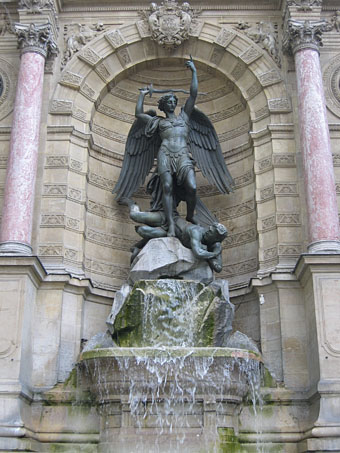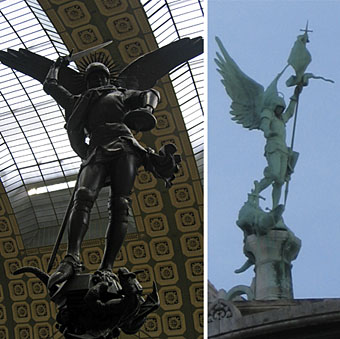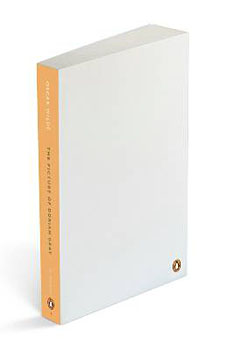 Irony never rests in the world of religion these days. I suspect Oscar would be pleased by this attention, he had an audience with Pius IX when he was a young man and wrote a poem, Urbs Sacra Aeterna, to celebrate the occasion. As noted earlier, a recent Out.com article explored rumours that the Vatican may be more friendly with Dorothy than is usually supposed.
Irony never rests in the world of religion these days. I suspect Oscar would be pleased by this attention, he had an audience with Pius IX when he was a young man and wrote a poem, Urbs Sacra Aeterna, to celebrate the occasion. As noted earlier, a recent Out.com article explored rumours that the Vatican may be more friendly with Dorothy than is usually supposed.
Vatican comes out of the closet and embraces Oscar
Although Oscar Wilde had a gay relationship, the Vatican is championing his razor-sharp moral maxims, not his lifestyle.
Richard Owen
Friday, January 5th, 2007
The Times
Oscar Wilde, poet, playwright, gay icon and deathbed convert to Catholicism, has been paid a rare tribute by the Vatican. His aphorisms are quoted in a collection of maxims and witticisms for Christians that has been published by one of the Pope’s closest aides.
Wilde (1854-1900) had long been regarded with distaste by the Vatican — a dissolute and disgraced homosexual who was sentenced for acts of gross indecency over his relationship with Lord Alfred Douglas.
The book, compiled by Father Leonardo Sapienza, head of protocol at the Vatican, includes such Wildean gems as “I can resist everything except temptation” and “The only way to get rid of a temptation is yield to it” — hardly orthodox Catholic teaching.
Father Sapienza said that he had devoted the lion’s share of Provocations: Aphorisms for an Anti-conformist Christianity to Wilde because he was a “writer who lived perilously and somewhat scandalously but who has left us some razor-sharp maxims with a moral”. The book also includes contributions from the Colombian philosopher Nicolás Gómez Dávila.
Father Sapienza said that Wilde had been a great writer of powerful force and dazzling intelligence who was now chiefly remembered not for his promiscuity but for plays such as The Importance of Being Earnest and An Ideal Husband as well as moral tales such as The Picture of Dorian Gray, in which a vain young man pays a terrible price for selling his soul to gain eternal youth.
Father Sapienza said that he wanted to “stimulate a reawakening in certain Catholic circles”. Christianity was intended to be a radical cure, not a humdrum remedy for the common cold: “Our role is to be a thorn in the flesh, to move people’s consciences and to tackle what today is the No 1 enemy of religion — indifference.”
“What a surprise!” La Repubblica’s said. “A homosexual icon has been accepted by the Vatican.” Orazio La Rocca, a Vatican watcher, described the book as a bombshell.
Pope Benedict XVI is a stern opponent of gay marriage and has reinforced Catholic teaching that homosexuality is a disorder. On the other hand he has belied his reputation as a hardliner since his election, reserving most of his fire for apathy and relativism in an attempt to revive Christian faith in Europe.
Wilde, who was married and had two children, was arrested and tried in 1895 over his relationship with Lord Douglas (known as Bosie), son of the Marquess of Queensberry, who had accused Wilde of sodomy. The writer sued Queensberry but lost and was sentenced to two years’ hard labour.
He displayed a long fascination with Catholicism, once remarking: “I am not a Catholic — I am simply a violent Papist.” He was born in Dublin to a Protestant family but fell under the spell of Catholicism at Oxford. He even made a journey for an audience with the Pope, but declared: “To go over to Rome would be to sacrifice and give up my two great Gods: Money and Ambition.” The way for Wilde’s rehabilitation was paved six years ago by a Jesuit theologian, Father Antonio Spadaro. On the centenary of Wilde’s death, he raised eyebrows by praising the “understanding of God’s love” that had followed Wilde’s imprisonment in Reading.
Father Spadaro said that at the end of his life Wilde had seen into the depths of his own soul and in his last works, such as De Profundis, had made “an implicit journey of faith”. He said that Wilde had come to see that God was capable of “breaking hearts of stone and entering into them with mercy and forgiveness”.
The wit and wisdom of Wilde
• Those who see any difference between soul and body have neither.
• I am not in favour of long engagements. They give people the opportunity of finding out each other’s character before marriage.
• One’s real life is often the life that one does not lead. I see an intimate connection between the life of Christ and the life of the artist. Christ’s place indeed is with the poets.
• I can resist everything except temptation.
• We are all in the gutter, but some of us are looking at the stars.
• It is the confession, not the priest, that gives us absolution.
• The only way to get rid of a temptation is to yield to it.
• There is only one thing in the world worse than being talked about, and that is not being talked about.
• Children begin by loving their parents; as they grow older they judge them; sometimes they forgive them.
• Nothing makes one so vain as being told that one is a sinner.
• In this world there are only two tragedies. One is not getting what one wants, and the other is getting it.
• What is a cynic? A man who knows the price of everything and the value of nothing.
• Experience is the name everyone gives to their mistakes.
• What a pity that in life we only get our lessons when they are of no use to us.
Previously on { feuilleton }
• Gay for god
• The Picture of Dorian Gray I & II
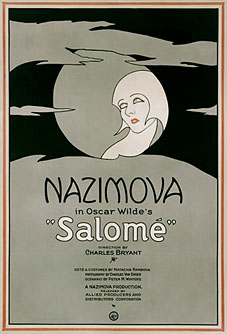 We tend to think of cinema as a modern medium, quintessentially 20th century, but the modern medium was born in the 19th century, and the heyday of the Silent Age (the 1920s) was closer to the Decadence of the fin de siècle (mid-1880s to the late-1890s) than we are now to the 1970s. This is one reason why so much silent cinema seems infected with a Decadent or Symbolist spirit: that period wasn’t so remote and many of its more notorious products cast a long shadow. Even an early science fiction film like Fritz Lang’s Metropolis has scenes redolent of late Victorian fever dreams: the vision of Moloch, Maria’s parable of the tower of Babel, the coming to life of statues of the Seven Deadly Sins, and—most notably—the vision of the Evil Maria as the Whore of Babylon. Woman as vamp or femme fatale was an idea that gripped the Decadent imagination, and it found a living expression in the vamps of the silent era, beautiful women with exotic names such as Pola Negri, Musidora (Irma Vep in Feuillade’s Les Vampires) and the woman the studios and press named simply “the Vamp”, Theda Bara (real name Theodosia Burr Goodman).
We tend to think of cinema as a modern medium, quintessentially 20th century, but the modern medium was born in the 19th century, and the heyday of the Silent Age (the 1920s) was closer to the Decadence of the fin de siècle (mid-1880s to the late-1890s) than we are now to the 1970s. This is one reason why so much silent cinema seems infected with a Decadent or Symbolist spirit: that period wasn’t so remote and many of its more notorious products cast a long shadow. Even an early science fiction film like Fritz Lang’s Metropolis has scenes redolent of late Victorian fever dreams: the vision of Moloch, Maria’s parable of the tower of Babel, the coming to life of statues of the Seven Deadly Sins, and—most notably—the vision of the Evil Maria as the Whore of Babylon. Woman as vamp or femme fatale was an idea that gripped the Decadent imagination, and it found a living expression in the vamps of the silent era, beautiful women with exotic names such as Pola Negri, Musidora (Irma Vep in Feuillade’s Les Vampires) and the woman the studios and press named simply “the Vamp”, Theda Bara (real name Theodosia Burr Goodman).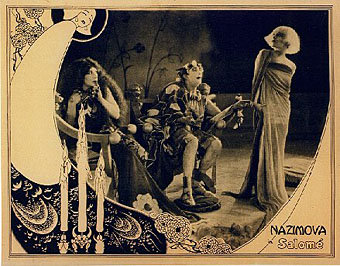

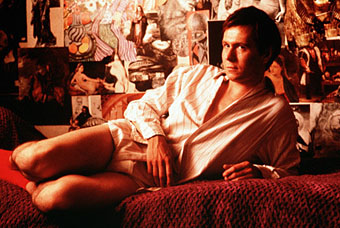
 Irony never rests in the world of religion these days. I suspect Oscar would be pleased by this attention, he had an audience with Pius IX when he was a young man and wrote a poem,
Irony never rests in the world of religion these days. I suspect Oscar would be pleased by this attention, he had an audience with Pius IX when he was a young man and wrote a poem, 